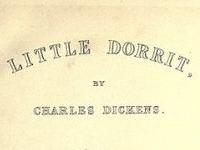BROOKE GLADSTONE: Do you love reading or do you love books? To answer this question for herself, City University of New York Dean Ann Kirschner set out to read the Charles Dickens classic Little Dorrit four ways, as a paperback, on her Kindle, on her iPhone and as an audio book.
NARRATOR: “Everything in Marseilles, and about Marseilles, had stared at the fervid sky and been stared at in return, until a staring habit had become universal there. Strangers were stared out of countenance by staring white houses, staring white walls, staring white streets, staring tracts of arid road, staring hills from which verdure was burnt away.”
BROOKE GLADSTONE: When we spoke to her earlier this year, Kirschner told us she began her career as a lecturer in Victorian literature at Princeton University. Hers has been a life steeped in books, which makes her experiment all the more intriguing.
ANN KIRSCHNER: Well, I really didn't set out to be scientific. I really set out to be practical. We don't read, or at least I don't read with the same leisure time that I did as a graduate student, when I could spend hours and hours reading a Victorian novel. I was facing a thousand pages of reading that had to be crammed in, with a day job and family responsibilities and other leisure time activities. And so, given the multitasking reading environment that I have now, how would I best read? That was really the question.
BROOKE GLADSTONE: So let's begin with the baseline, reading Little Dorrit as a book.
ANN KIRSCHNER: So, I'd go to the shelf, and there’s my orange Penguin paperback waiting for me. And I open it up, and the first thing that just washed over me was nostalgia because there was my name and the date and my little marginalia that I had written as a graduate student. So it was like encountering myself, as well as encountering Dickens. The paperback felt absolutely wonderful in my hands. But then I left my apartment and went down into the New York City subway, and in a crowded New York City subway it’s a little hard to maneuver that paperback. And so, I started thinking, well maybe I should look at the audio book Little Dorrit, as well, because I'm an audio book lover.
BROOKE GLADSTONE: Ah-ha. You are an audio book lover, and yet many will dismiss this way of reading as not really reading at all.
ANN KIRSCHNER: Oh, I think that’s an ideological falsity. It’s reading. It’s just reading in a different format. When you read an audio book, you’re sort of at the mercy of the narrator. You can't easily go back, you can't easily go forward. So you’re a relatively passive reader. But it lends itself to reading in all kinds of unusual places. You know, you’re having your teeth cleaned, great time to read [LAUGHS] an audio book.
[BROOKE LAUGHS] You’re putting your makeup on. When I'm traveling on business, I set my iPhone for a 30-minute countdown, and usually I'm asleep by the end of the 30 minutes.
BROOKE GLADSTONE: Well, let's wait on the iPhone and skip over to the Kindle, which I understood you received as a gift more than a year ago. Did that change the way you took in the story, absorbed the words?
ANN KIRSCHNER: Reading electronically you have a lot more control. If you want to make the font larger, you can. If you want to play with the margins, you can. What I didn't like about the Kindle was that I had to make a conscious decision to take it with me.
BROOKE GLADSTONE: Mm-hmm. I have a friend who said she likes it better than a book because turning the virtual page is so instantaneous and effortless that she felt like a rat in a Skinner box pushing for a pellet, another pellet, another pellet.
ANN KIRSCHNER: [LAUGHS]
BROOKE GLADSTONE: In a good way.
ANN KIRSCHNER: Then she ought to try the iPhone, because one of the areas that I actually find annoying about the Kindle is that little click, click, click, because there’s a nanosecond when the screen goes black. And I found that that really sort of disturbed my sense of seamless reading.
BROOKE GLADSTONE: Ah, the iPhone which seems, on the face of it, to offer the least enjoyable experience because the screen is so small. And yet, I have a friend who reads Jane Austen on hers. Hi, Lynn. Is she weird?
ANN KIRSCHNER: [LAUGHS] She’s not weird [LAUGHING] at all. Go, Lynn! The iPhone was the revelation to me. The screen is brighter, crisper. You can change pages instantaneously. But the most important thing is that the iPhone is always with you, or at least always with me.
[BROOKE LAUGHS] And, you know, the old Woody Allen line, 70 percent of success in life is just showing up? The iPhone showed up, and I didn't have to make a conscious decision to take another unit with me, another set of plugs. That made all the difference in the world. I think if Dickens were alive today, he'd be saying, let's experiment with all of these formats.
BROOKE GLADSTONE: I think if Dickens were alive today, he'd [LAUGHS] probably say, I don't care, as long as I'm paid.
ANN KIRSCHNER: Well, you’re absolutely right. And, of course, Dickens performed his books. You know, he'd love the audio book format because he stood in front of a stage and brought people to tears reading his books.
BROOKE GLADSTONE: Boy, don't you wish audio books were around when Dickens was reading his?
ANN KIRSCHNER: Oh, can you imagine, to have a recording of Dickens reading Little Dorrit? Oh, it would be quite amazing.
BROOKE GLADSTONE: Ann, thank you very much.
ANN KIRSCHNER: Thank you.
BROOKE GLADSTONE: Ann Kirschner is university dean of Macaulay Honors College at the City University of New York, and she’s author of Sala’s Gift.
